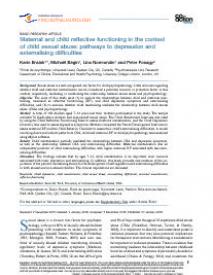Maternal and child reflective functioning in the context of child sexual abuse : pathways to depression and externalising difficulties
Background: Sexual abuse is a well-recognised risk factor for child psychopathology. Little is known regarding whether child and maternal mentalization can be considered a potential resource or protective factor in this context, respectively, mediating or moderating the relationship between sexual abuse and psychopathology.
Objective: The aims of this study were (1) to explore the relationships between child and maternal mentalizing, measured as reflective functioning (RF), and child depressive symptoms and externalising difficulties; and (2) to examine whether child mentalizing mediates the relationship between child sexual abuse (CSA) and psychopathology.
Method: A total of 168 children aged 7–12 years and their mothers participated in the study. The sample included 74 dyads where children had experienced sexual abuse. The Child Attachment Interview was rated by using the Child Reflective Functioning Scale to assess children’s mentalization, and the Child Depression Inventory was used to assess depressive symptoms. Mothers completed the Parent Development Interview to assess maternal RF and the Child Behavior Checklist to assess their child’s externalising difficulties. A model involving direct and indirect paths from CSA, child and maternal RF to child psychopathology was examined using Mplus software.
Results: Child mentalization partially mediated the relationships between CSA and depressive symptoms, as well as the relationship between CSA and externalising difficulties. Maternal mentalization was an independent predictor of child externalising difficulties, with higher maternal RF associated with less externalising difficulties.
Discussion: The findings indicate that by ages 7–12, child mentalization is an important inner resource associated with lower depression and externalising. In addition, this study provides new evidence of the importance of the parent’s mentalizing stance for the development of self-regulation and externalising difficulties in both abused and non-abused children. The clinical implications are discussed.
In: European journal of psychotraumatology, ISSN 2000-8066 | 7 | 1 | januari | 30611
http://dx.doi.org/10.3402/ejpt.v7.30611


